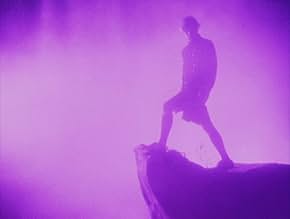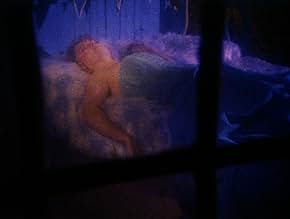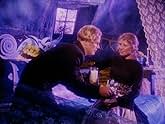The wary residents of a 19th century mountain village must tread carefully and speak softly lest they cause an avalanche. Sexual frenzies teem in this world of repression, setting off incest... Read allThe wary residents of a 19th century mountain village must tread carefully and speak softly lest they cause an avalanche. Sexual frenzies teem in this world of repression, setting off incestuous love triangles with deadly consequences.The wary residents of a 19th century mountain village must tread carefully and speak softly lest they cause an avalanche. Sexual frenzies teem in this world of repression, setting off incestuous love triangles with deadly consequences.
- Awards
- 1 win total
Andrea Von Wichert
- Townsperson
- (as Andrea Wichert)
Featured reviews
This is the second Guy Maddin film that I've seen (the other being "Twilight of the Ice Nymphs") and in both cases, the films wore out their welcome about half an hour in.
I enjoy the offbeat style of the humor, the intentional visual stylization patterned after early silent films (this one reminded me particularly of the work of Melies), and I have no problem with the flat acting style (which is an honest homage to early film acting) or the coloring (which, again, is based in films of yesteryear). Where Maddin's films run into trouble is, as soon as the novelty has worn off and the character based introductory jokes have played out, there is simply nothing beneath it all for the film to fall back on.
The story is actually very simple, yet it is so relentlessly bizarre that it borders on surrealism. So, either there is no deeper meaning to the story, or it's so far buried that it eludes me during the actual viewing of the piece. (Not that one can't come up with various things after the fact; I simply doubt that the director intended them or had any control over them if I can only interpret the vaguest elements of the story.)
The concept of Oedipal lust and such simply aren't enough to sustain a film of this length. Not in the way that they are handled anyway. The film is absolutely brilliant up until Johann dies. It then withers quickly, as the last real belly laugh comes in the first few minutes of "Part Two." The remaining hour or so limps along to a decent though unsatisfying end.
Guy Maddin is without doubt a clever and unique director, and I look forward to the day when I can say that I've seen him at his best. But he's far from it in this film in my opinion.
Endless homages to early films aren't enough to last 100 minutes... And perversity caused by child rearing needs to be handled more cleverly to take up the slack...
I enjoy the offbeat style of the humor, the intentional visual stylization patterned after early silent films (this one reminded me particularly of the work of Melies), and I have no problem with the flat acting style (which is an honest homage to early film acting) or the coloring (which, again, is based in films of yesteryear). Where Maddin's films run into trouble is, as soon as the novelty has worn off and the character based introductory jokes have played out, there is simply nothing beneath it all for the film to fall back on.
The story is actually very simple, yet it is so relentlessly bizarre that it borders on surrealism. So, either there is no deeper meaning to the story, or it's so far buried that it eludes me during the actual viewing of the piece. (Not that one can't come up with various things after the fact; I simply doubt that the director intended them or had any control over them if I can only interpret the vaguest elements of the story.)
The concept of Oedipal lust and such simply aren't enough to sustain a film of this length. Not in the way that they are handled anyway. The film is absolutely brilliant up until Johann dies. It then withers quickly, as the last real belly laugh comes in the first few minutes of "Part Two." The remaining hour or so limps along to a decent though unsatisfying end.
Guy Maddin is without doubt a clever and unique director, and I look forward to the day when I can say that I've seen him at his best. But he's far from it in this film in my opinion.
Endless homages to early films aren't enough to last 100 minutes... And perversity caused by child rearing needs to be handled more cleverly to take up the slack...
If you are a fan of German Expressionism, then you will enjoy this modern homage to a beautiful and arresting style perceived and captured wonderfully by Guy Maddin. There is a ton of symbolism and exploration of the sexual taboos found in both the Oedipus and Cassandra complexes of Greek mythology while allowing for quite humorous character developments which certainly make the film that much more enjoyable than just an "art" film. Maddin's use of light and especially color adds to the classic expressionist model which gets a gorgeous injection of modern fare. While I can enjoy the notion of one reviewer calling this a cross between "The Wizard of Oz and Eraserhead", I definately saw this as a much more direct colorful homage to "Caligari" than anything Lynch-esque. There is not the mind-numbing mixture of light and sound which generates its own tension but rather a playful use of sets and characters which surmount to quite a comical time. That is not to say there is not a scene or two that would make a horror fan happy but they are very straight forward and even amusing.
I love Guy Maddin's work and this is my favourite of his films. It's odd and unsettling and it sticks with you long after you've watched it.
It's definitely not the most accessible of his works, but I like it. It's been described as a "pro-repressionist" movie, but I don't think that's entirely accurate.
The people portrayed in the village are deeply repressed and one small push makes their whole stack of cards morals come tumbling down. It's tale of three brothers and their trials and tribulations.
Their father is deceased and one brother, Vince Rimmer as Franz, is an invalid confined to the attic, who can do little more than watch as his brothers are tempted and run amok.
First Brent Neale as Johann, then Kyle McColloch as Grigorss give in to their desires and forbidden longings with tragic consequences. Kyle McColloch is a Maddin regular and he shines here.
Engagements are broken, people have knife fights and their mother is seeking to re-marry.
It's definitely not the most accessible of his works, but I like it. It's been described as a "pro-repressionist" movie, but I don't think that's entirely accurate.
The people portrayed in the village are deeply repressed and one small push makes their whole stack of cards morals come tumbling down. It's tale of three brothers and their trials and tribulations.
Their father is deceased and one brother, Vince Rimmer as Franz, is an invalid confined to the attic, who can do little more than watch as his brothers are tempted and run amok.
First Brent Neale as Johann, then Kyle McColloch as Grigorss give in to their desires and forbidden longings with tragic consequences. Kyle McColloch is a Maddin regular and he shines here.
Engagements are broken, people have knife fights and their mother is seeking to re-marry.
I recently watched the film, Careful, by Guy Maddin on television and found it to be very interesting indeed. The person introducing the film called Maddin a Canadian David Lynch and while both directors do have a certain flair for the unusual, I believe Lynch to be a surrealist while Maddin's style to be something else entirely. Granted, Careful is the only film of Maddin's I have seen except for excerpts and press for The Saddest Music in the World, but his style, at least in this film, is one of sentimentality and homage. I have seen plenty of German Expressionist films and Careful would seem to fit right into that mold. I myself have often toyed with the idea of producing a film in the Expressionist style if only for the exercise of it. Maddin has produced an Expressionist film in the year 1992 which flawlessly mimics the films of Ufa, Wiene, Murnau, and Lang from the early 20th century. Any viewer, even those versed in early Expressionism, who would happen across this film without any context would be forgiven for mistaking it to be an actual 80-year-old film, so true is Maddin's style, so exacting is his pacing. Full frame color tinting, sound stage shooting, post-produced soundtrack, rigid acting style, and obsolete directorial choices, combine to provide the viewer with a disturbing portrait of repression, duty, and mountain goats. This film is incredible!
Influenced by the German Expressionist films of the 1920s and filtered through the oddball sensibilities of writer/director Guy Maddin, Careful is a film like no other. Maddin appropriates silent cinema's monochrome aesthetic in multiple scenes but even when color is being used in a more traditional way he tends to fill the screen with garish brightness. The film has (melo)dramatic elements but is primarily comedic, albeit with a wink and a nudge subtlety almost altogether absent from silent film's heyday.
The bizarre plot of the film is centered on a repressed mountain community, particularly the brothers Johan and Grigors and their mother. The boys' father, who lost both his eyes in separate freak accidents, is long since dead and their older brother is locked in the attic where he silently watches. Johan and his younger brother spend most of their time in a strict school for butlers where they learn about dining etiquette and grooming. Johan becomes engaged to Klara, a local girl who lusts after her own father in spite of his clear favoritism toward his younger daughter, in spite of his own obsessive lust directed at his mother. Naturally, characters become involved in murder plots, duels, and suicide as they're too repressed and shut off to resolve their problems in a less dramatic fashion.
Thematically, Careful is too jumbled to have much coherence but like most Maddin films this is more about style than plot or meaning. Maddin's creative visual style is engaging enough on its own to make Careful a worthwhile film.
The bizarre plot of the film is centered on a repressed mountain community, particularly the brothers Johan and Grigors and their mother. The boys' father, who lost both his eyes in separate freak accidents, is long since dead and their older brother is locked in the attic where he silently watches. Johan and his younger brother spend most of their time in a strict school for butlers where they learn about dining etiquette and grooming. Johan becomes engaged to Klara, a local girl who lusts after her own father in spite of his clear favoritism toward his younger daughter, in spite of his own obsessive lust directed at his mother. Naturally, characters become involved in murder plots, duels, and suicide as they're too repressed and shut off to resolve their problems in a less dramatic fashion.
Thematically, Careful is too jumbled to have much coherence but like most Maddin films this is more about style than plot or meaning. Maddin's creative visual style is engaging enough on its own to make Careful a worthwhile film.
Did you know
- TriviaRebecca Gibson's debut.
- ConnectionsFeatured in Guy Maddin: En attendant le crépuscule (1997)
- How long is Careful?Powered by Alexa
Details
Contribute to this page
Suggest an edit or add missing content
























